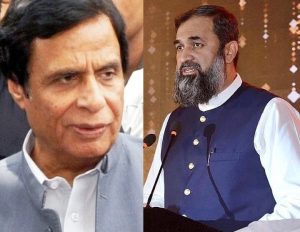Elahi petitions the LHC to contest the de-notification order issued by the governor.
Within hours of being formed, the five-member bench was dissolved, and the case file was once again forwarded to the chief justice of the LHC.

Chaudhry Pervez Elahi, the leader of the Pakistan Muslim League-Q (PML-Q), challenged Governor Punjab Balighur Rehman’s decision to de-notify him as the provincial chief minister by filing a plea in the Lahore High Court (LHC) on Friday.
Rehman de-notified CM Elahi in the early hours of Friday for refusing to accept a vote of confidence from the province legislature on his order on Wednesday, December 21.
According to a statement sent out by the Governor House after midnight, Chief Minister Elahi lost his position as soon as the provincial cabinet was dissolved.
But it also stated that Elahi will continue in office in accordance with Article 133 of the Constitution up until the provincial parliament chose a new chief minister.
A judge declines to serve.
Hours after being established by the chief justice of the LHC to hear Elahi’s case today, a five-person bench presided over by Justice Abid Aziz Sheikh was disbanded.
Justice Farooq Haider, a member of the bench, reportedly withdrew from the case because he had previously represented the PML-Q leader’s interests in other matters, according to Justice Sheikh.
According to sources, the case file was thereafter sent to the LHC chief justice once more in order to form a fresh bench.
It is important to note that the petitioner’s attorney has asked the court to quickly form a bench to consider the plea.
The request
Elahi has asked for the aforementioned decision to be annulled and for the session of the Punjab Assembly that was called by the governor on Wednesday to be ruled illegal in the plea that was submitted today.
The appeal requested that the dissolution of the provincial cabinet in the contested order be ruled invalid and that the petitioner continue to keep his position as chief minister of Punjab.
Through attorneys Syed Ali Zafar and Amir Saeed Rawn, Elahi filed the petition with the claim that “two impugned orders passed by the respondent Governor of Punjab – one on December 19, 2022, wherein the governor had summoned the House for December 21, requiring CM Elahi to obtain a vote of confidence, and the second one on December 22, 2022, wherein the CM was de-notified over his failure to obtain the vote of confidence, are unlawful and uncon
It also stated that the challenged order, which was issued on December 19, 2022 and called the Punjab Assembly session for a vote of confidence, was illegal for the following reasons:
(1) The Provincial Assembly’s session is called either by: (a) the Governor in accordance with Article 109 of the Constitution (the Governor alone may prorogue a session that the Governor has called); or (b) the Speaker in accordance with Article 54(3) read in conjunction with Article 127 of the Constitution in response to a request made by the Assembly’s members (session having been summoned by the Speaker is required to be prorogued only by the Speaker).
(2) In accordance with rules 3 and 4 of the Rules of Procedure of the Provincial Assembly of the Punjab 1997, the Secretary Assembly is required to publish notices of summoning and prorogation orders by the Governor or, as the case may be, the Speaker in the official gazette.
(3) As stated in Rule 3 of the Rules of Procedures of the Provincial Assembly of the Punjab in 1997, the Speaker has already called the assembly into session in accordance with Article 54(3) read with Article 127 of the Constitution. The aforementioned session may only be adjourned by the Speaker while it is still in session.
(4) A new session cannot be called by the Governor during the validity of a session that has been called by the Speaker unless and until the current session is prorogued.
(5) According to a three-member LHC bench in Manzoor Ahmad Wattoo v. Federation of Pakistan, PLD 1997 Lahore 38, the issue of the Chief Minister’s standing in accordance with Article 130(7) of the Constitution can only be resolved in a session that has been particularly called for this reason.
(6) The Governor previously convened the Assembly’s 41st session at Aiwan-e-Iqbal on Edgerton Road in Lahore via a notification (41st Session) issued on June 14, 2022; however, the Governor never prorogued the aforementioned session. As a result, the Governor lacks the authority to call the meeting where a vote of confidence in the Chief Minister must be obtained.
Without affecting the constitutionality of the respondent’s (the governor of Punjab) act of calling the Punjab Assembly’s session during the current session, the petitioner continued, “It is respectfully submitted that the respondent governor neither has the authority to appoint nor has the power to remove the petitioner, and there is no constitutional provision enabling the governor Punjab to pass the impugned order on December
It argued that the resolution of vote of no confidence brought up by the 20% is still pending before the Provincial Assembly and that the impugned order made the resolution infructuous, undermining the assembly members’ ability to vote against the petitioner with a vote of no confidence.
“The order passed by the governor is violative of the fundamental rights of the citizens and residents of the Province of Punjab as their province is being deprived of the governance by the duly elected Chief Minister,” the petition stated. “It is also violative of the fundamental rights of the members of the Provincial Assembly of Punjab.”










































